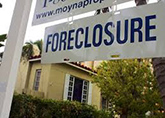FORECLOSURE – KNOWING YOUR RIGHTS MATTERS – PART III: OPTIONS AND DEFENSES
This is the third article of the three-part series provided to the public as a service by Living with the Law because of the importance and magnitude of the subject. This article lays out your options if you are headed for default, in default, or in any phase of the foreclosure process. Each person’s situation is different and what works for someone may not work for you. Each of the options discussed is simply an overview of complex issues. We cannot stress enough how important it is to seek qualified help either from an attorney and/or housing counselor as soon as you know you will have trouble paying your mortgage. These articles provide you with links to important resources. Much more information and direct assistance will be available to you on April 1st and 2nd, 2016 at the “Preventing Homelessness – Foreclosure and Eviction in Washington, DC” Conference hosted by the Benjamin Banneker Development Corporation, a 501(c) (3) nonprofit Corporation that works to advance community development across the District of Columbia, and affect positive, sustainable change in our communities through urban development, education and philanthropic initiatives and sponsored in part by Living With The Law.
- OPTIONS BEFORE AND DURING LOAN DEFAULT
If your financial difficulties are temporary and you just need help making the payments more manageable, the following options may help you avoid default and eventual foreclosure.
Federal Loan Modification Programs
In 2009, in the wake of the mortgage crisis, the federal government passed two laws to help homeowners avoid foreclosure. Both programs will end in December 2016 unless further extended.
- Refinance Your Loan. The Home Affordable Refinance Program, or HARP.
This option applies before the start of any pre-foreclosure process. Under this law, if your loan is owned by Freddie Mac or Fannie Mae and was made on or before 31 May 2009, a lender may refinance an adjustable rate mortgage (many homeowners default when their automatic higher interest rates kick in) to a fixed rate loan. The basic eligibility requirements are -
- You cannot have more than one late payment (more than 30 days late) in the past 12 months and in the last six months (prior to applying) no payment can be more than 30 days late.
- Your home must be your primary residence, a 1-unit second home or a 1- to 4-unit investment property.
- Your current loan-to-value (LTV) ratio must be greater than 80% (the amount of your loan should be at least 20% less than the appraised value of the property).
You can learn more about the program, look up to see if your loan is Fannie or Freddie Mac loan and use the LTV tool by going to http://www.harp.gov/Eligibility.
- Lower Your Monthly Mortgage Payment. The Home Affordable Modification Program, or HAMP.
If you don’t qualify for refinancing, HAMP is an option unless your foreclosure sale is scheduled within seven days before the date of your application. Under the HAMP program a lender may lower the monthly payment on your first mortgage to 31% of your gross income. A timely application freezes the foreclosure proceeding until you receive notice that you are not eligible for any loss mitigation option (and any appeal has been exhausted), you decline a loan modification offer, or if you agree to one, you again default on the new payments. If your loan was made before 1 January 2009, you may qualify if you meet all of these basic eligibility requirements -
- The unpaid balance of your loan is equal to or less than $729,750 (one unit single family residence).
- You've experienced a financial hardship.
- You can show (by way of a tax return and wage stubs) that you have enough steady income to make the payments under a modified loan.
- You have not been convicted of felony larceny, theft, fraud or forgery, money laundering or tax evasion, in connection with a mortgage or real estate transaction within the last ten years.
For more information about this program and incentives offered under it (up to $10,000 in principal reduction for timely payments) visit https://www.makinghomeaffordable.gov.
Lender Loan Modification Programs
If you don’t meet the federal loan program requirements, you may be able to get your lender to lower your interest rate, change your interest rate from an adjustable to a fixed rate, or extend the length of the loan to lower the payments. Most lenders would prefer not to incur the cost of foreclosure. Some lenders also have their own loan modifications programs as a result of settlements reached to resolve claims related to lending practices with federal and state governments. These banks include Bank of America, CitiMortgage, JP Morgan Chase, and Wells Fargo. The banks also sponsor their own foreclosure prevention workshops that allow you to meet with their representatives and housing counseling agencies. Learn more about each of their programs by clicking on the links on the National Consumer Law Center website
Forbearance
Ask your lender to give you a two to three month break from payments until you get back on your feet financially. You will have to resume normal payments plus the missed payments and the length of your loan will be extended.
You are more likely to succeed with your lender by using a HUD-approved housing counselor to help you.
Reverse Mortgage
If you are 62 years or older and have equity in your home, this HUD loan program allows you to obtain a new loan to pay off the first. With a reverse mortgage you do not have to make any mortgage payments (you still must pay real estate taxes and insurance) you can live in the home until you permanently move out or upon your death. The mortgage becomes due then and your heirs may forfeit any benefit from their inheritance if no equity remains in the house because the mortgage payments are add up over the years. For more information about reverse mortgages see -http://portal.hud.gov/hudportal/HUD?src=/program_offices/housing/sfh/hecm/rmtopten
You’ve cut corners, turned to family and friends, but there’s no way you can catch up on payments. You’ve also been denied loan refinancing or modification. What’s next? The following strategies may buy you more time to get your financial house in order, allow you to stay in your home longer or save your home from foreclosure.
Reinstate Your Loan
In the District of Columbia, you have a right to reinstate your loan up to five (5) business days before a foreclosure sale occurs. This option requires you to come up with all the payments you missed in a lump sum by a specific date to which the lender agrees. Generally, you can only reinstate once every two (2) years under D.C. law, unless your mortgage allows you to do so more often or your lender agrees.
File for bankruptcy
This option is a way to save your house or stay in it longer. Once you file a bankruptcy petition, there is an automatic stay (that is, stop) on any foreclosure proceedings, unless the Bankruptcy Judge grants a lender’s request to continue with the sale. There are two ways to file for bankruptcy- either through Chapter 13 or Chapter 7. In Chapter 13, you keep your home as long as you follow the plan ordered by the Bankruptcy Judge to repay all or most of your debt over a three to five year period. The plan will most likely allow you to pay only some portions of your unsecured debt such as credit cards that frees up money to pay your mortgage. Chapter 7 Bankruptcy can help you buy some time to save up money and make other living arrangements because you can live in the home without making payments while the bankruptcy is pending. The mortgage debt or any home equity loans will be cancelled, but not the lien against the house and you will still have to eventually give up the house unless you use the freed up money to work out a repayment plan with the lender. You cannot file Chapter 7 once you are in default. Both options have complicated rules including income and asset eligibility restrictions. To determine which option is best for you, consult with a bankruptcy attorney.
Sell Your Home Before Foreclosure
If you have equity (it can be sold for more than your mortgage plus costs) you can sell it before a foreclosure and use the proceeds to pay off your loan.
Short Sale
Even if you do not have equity, you can sell the house for less than the mortgage amount and ask the lender to accept the sale proceeds as full payment. Under D.C. Law, the lender has the right take you to court for the deficiency – the difference between what you owe on the mortgage and any missed payments, penalties and costs and the amount you received from the sale. Lenders will most likely prevent you from receiving any money from the sale. If you have more than one loan on the property (e.g. a second home equity loan), the first mortgage lender will negotiate an amount to pay off the second lender so that the first mortgage lien can be released.
Give Up the House - Deed in Lieu of Foreclosure
This may be the last thing you want to do, but if the American Dream of owning a home has become a nightmare and your and your family’s physical and emotional health are suffering, the best thing may be to cut your losses and walk away with some dignity and a chance to start fresh. A deed in lieu of foreclosure allows you to transfer the property back to the lender and cancels your mortgage loan completely. This option is available one if there is no second or third mortgage. Lenders generally prefer not to incur the cost of selling a house and may be reluctant to grant a deed in lieu of foreclosure.
- DEFENDING YOURSELF ONCE THE FORECLOSURE PROCESS BEGINS
As we mentioned in a previous article, D.C. allows both non-judicial and judicial foreclosures and a lender may choose either. Many lenders and their counsel like to make the homeowner think that foreclosure is automatic because of your non-payment. It is not. When all the above options fail or are no longer available, YOU STILL HAVE LEGAL RIGHTS AVAILABLE TO YOU.
In a Non-Judicial Foreclosure Sale, as soon as you receive the Notice of Intention to Foreclose, you have the right to elect not to mediate and to file a lawsuit against the lender and the trustee (the lender’s agent bringing the foreclosure action) to stop the sale of your property. In a Judicial Foreclosure, you can fight against the foreclosure in Court by filing a response within the time period stated in the summons to the complaint (20 days). A foreclosure lawsuit is just like any other case, and you have the right to insist that the lender follow the procedures established by law, the right to a jury trial, the right to conduct discovery of information from the lender, and the right to present expert testimony and other evidence. If you bring a suit in a non-judicial foreclosure, you have to prove that the foreclosure should be stopped.
Typically, you would ask the court for a temporary restraining order (TRO) by convincing the judge that you will suffer “irreparable injury” if the judge doesn’t stop the foreclosure immediately. Most courts agree that a foreclosure causes irreparable injury because you will lose your home and perhaps your only shelter if the foreclosure goes forward. You will most likely be required to post a bond to protect the lender from economic harm if you lose the case. You might be able to get the bond requirement waived if your income is low enough.
In a judicial foreclosure, once the lender files a complaint or lawsuit, you are sent a summons and a copy of the complaint. You have the right to defend yourself
against the foreclosure in an answer. If you don’t respond, the judge will let the foreclosure go through, that is, issue a default judgment against you.
There are several arguments that you or your lawyer can make in Court. These include:
- The lender did not follow the proper procedures required by law, for example, failed to provide a timely Notice of Default or Mediation Notice.
- The statute of limitations for initiating the foreclosure action is past. In D.C. the statute of limitations for contracts is three (3) years. Some lenders are so backlogged that by the time they get around to your case, three years from the first payment you missed may have already passed.
- The foreclosing party cannot prove it owns the mortgage and can’t produce the note. Your mortgage note may have been sold several times and the foreclosing party must prove that they actually own the Note through a proper transfer of title.
- The amount the lender says you owe is wrong due to failure to credit payments you made, failure to properly credit real estate taxes or insurance payments or double billing for these or charging excessive fees.
- The lender, either directly or through its mortgage broker, engaged in predatory or fraudulent lending practices in making the loan, for example, the loan was based on fraud and the lender or its mortgage broker encouraged you to sign up for a loan you could not afford.
- The lender violated federal laws in making the loan. These include the Real Estate Settlement Procedures Act (RESPA) or the Truth in Lending Act (TILA).
- The lender discriminated against you because of your race or some other class protected by the D.C. Human Rights Act or Federal Law.
In addition to asking the Court to stop the foreclosure, you may ask for the loan to be cancelled. You may also ask for money damages against the lender in the case of wrongful or fraudulent behavior. This list of defenses and arguments is not exhaustive and the arguments themselves are more involved than briefly summarized here. Unfortunately, in many cases the homeowner has a difficult burden and Courts in D.C. seem to rule more often in favor of lenders. Bringing a lawsuit can be costly, time and energy consuming. It is best to consult with an attorney to see how strong a case you have and if it is worth pursuing.
If you lose in Court, you do not have to move out right away. The lender has to obtain an eviction order. Many lenders end up taking their time, waiting for the market to improve. Rather than let the property become vacant and abandoned, you may get to stay in it payment free for a while.
NO ONE WANTS TO LOSE THEIR HOME AND YOU MAY NOT HAVE TO. THE IMPORTANT THING IS THAT YOU TAKE ACTION, DON’T PROCRASTINATE, DON’T PANIC, DONT GET SCAMMED. THERE ARE MANY RESOURCES AVAILABLE TO HELP YOU.






